Related Research Articles

Joseph Rudyard Kipling was an English novelist, short-story writer, poet, and journalist. He was born in British India, which inspired much of his work.
This is a bibliography of works by Rudyard Kipling, including books, short stories, poems, and collections of his works.

The Jungle Book (1894) is a collection of stories by the English author Rudyard Kipling. Most of the characters are animals such as Shere Khan the tiger and Baloo the bear, though a principal character is the boy or "man-cub" Mowgli, who is raised in the jungle by wolves. The stories are set in a forest in India; one place mentioned repeatedly is "Seonee" (Seoni), in the central state of Madhya Pradesh.

"If—" is a poem by English writer and poet Rudyard Kipling (1865–1936), written circa 1895 as a tribute to Leander Starr Jameson. It is a literary example of Victorian-era stoicism. The poem, first published in Rewards and Fairies (1910) following the story "Brother Square-Toes", is written in the form of paternal advice to the poet's son, John.

Just So Stories for Little Children is a 1902 collection of origin stories by the British author Rudyard Kipling. Considered a classic of children's literature, the book is among Kipling's best known works.
A colonial mentality is the internalized attitude of ethnic or cultural inferiority felt by people as a result of colonization, i.e. them being colonized by another group. It corresponds with the belief that the cultural values of the colonizer are inherently superior to one's own. The term has been used by postcolonial scholars to discuss the transgenerational effects of colonialism present in former colonies following decolonization. It is commonly used as an operational concept for framing ideological domination in historical colonial experiences. In psychology colonial mentality has been used to explain instances of collective depression, anxiety, and other widespread mental health issues in populations that have experienced colonization.

Juliana Horatia Ewing was an English writer of children's stories. Her writings display a sympathetic insight into children's lives, an admiration for things military, and a strong religious faith.
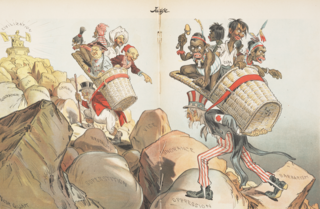
"The White Man's Burden" (1899), by Rudyard Kipling, is a poem about the Philippine–American War (1899–1902) that exhorts the United States to assume colonial control of the Filipino people and their country. Originally written to celebrate the Diamond Jubilee of Queen Victoria, the jingoistic poem was replaced with the sombre "Recessional" (1897), also a Kipling poem about empire.
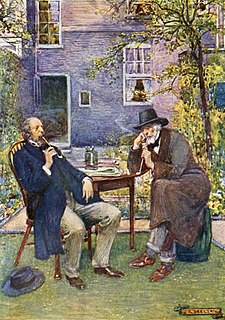
Victorian literature refers to English literature during the reign of Queen Victoria (1837–1901). The 19th century is considered by some to be the Golden Age of English Literature, especially for British novels. It was in the Victorian era that the novel became the leading literary genre in English. English writing from this era reflects the major transformations in most aspects of English life, from scientific, economic, and technological advances to changes in class structures and the role of religion in society. Famous novelists from this period include Charles Dickens, William Thackeray, the three Brontë sisters, George Eliot, and Thomas Hardy.

"Danny Deever" is an 1890 poem by Rudyard Kipling, one of the first of the Barrack-Room Ballads. It received wide critical and popular acclaim, and is often regarded as one of the most significant pieces of Kipling's early verse. The poem, a ballad, describes the execution of a British soldier in India for murder. His execution is viewed by his regiment, paraded to watch it, and the poem is composed of the comments they exchange as they see him hanged.
"The law of the jungle" is an expression that has come to describe a scenario where "anything goes". The Oxford English Dictionary defines the Law of the Jungle as "the code of survival in jungle life, now usually with reference to the superiority of brute force or self-interest in the struggle for survival".
Morton Norton Cohen was a Canadian-born American author and scholar who was a professor at City University of New York. He is best known for his studies of children's author Lewis Carroll including the 1995 biography Lewis Carroll: A Biography.

Akela is a fictional character in Rudyard Kipling's stories, The Jungle Book (1894) and The Second Jungle Book (1895). He is the leader of the Seeonee pack of Indian wolves and presides over the pack's council meetings. It is at such a meeting that the pack adopts the lost child Mowgli and Akela becomes one of Mowgli's mentors.
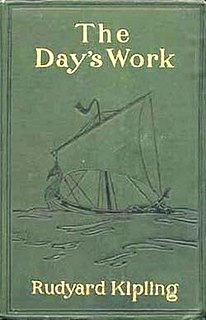
The Day's Work is a collection of short stories by Rudyard Kipling. It was first published in 1898. There are no poems included between the different stories in The Day's Work, as there are in many other of Kipling's collections.

"The Gods of the Copybook Headings" is a poem by Rudyard Kipling, characterized by biographer Sir David Gilmour as one of several "ferocious post-war eruptions" of Kipling's souring sentiment concerning the state of Anglo-European society. It was first published in the Sunday Pictorial of London on 26 October 1919; in America, it was published as "The Gods of the Copybook Maxims" in Harper's Magazine in January 1920.

Toomai of the Elephants is a short story by Rudyard Kipling about a young elephant-handler. It was first published in St Nicholas Magazine and reprinted in the collection of Kipling short stories, The Jungle Book (1894). The character Petersen Sahib is thought to be modelled on George P. Sanderson (1848–1892).
Harry Ricketts is a poet, biographer, editor, anthologist, critic, academic, literary scholar and cricket writer. He has written biographies of Rudyard Kipling and of a dozen British First World War poets.
"In the Neolithic Age" is a poem by the English writer Rudyard Kipling. It was published in the December 1892 issue of The Idler and in 1896 in his poetry collection The Seven Seas. The poem is the source of the quotation: "There are nine and sixty ways of constructing tribal lays, / And every single one of them is right."
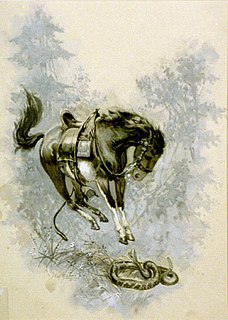
Isaac Walton Taber was an American illustrator active in the late 19th and early 20th centuries. He was also known as "Walton Taber." As his work was often credited to "I. W. Taber," he has been confused with the photographer Isaiah West Taber (1830-1912).
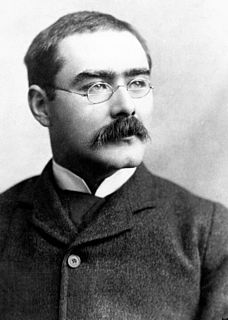
The 1907 Nobel Prize in Literature was awarded to the British writer Rudyard Kipling (1865–1936) "in consideration of the power of observation, originality of imagination, virility of ideas and remarkable talent for narration which characterize the creations of this world-famous author." He is the first English-language writer to receive the prize, and being aged 41, is its youngest recipient to date.
References
- ↑ Schell, Jennifer (2013). "Preface: "A Bold and Hardy Race of Men"". "A Bold and Hardy Race of Men": The Lives and Literature of American Whalemen. Amherst: University of Massachusetts Press. pp. ix–xiv. ISBN 9781613762738 . Retrieved 7 Jul 2015– via Project MUSE.
- ↑ S. C. Garrisona; Lector Hackworth (1931). "A comparison of ten book lists for children's reading". Peabody Journal of Education. 9 (2): 102–111. doi:10.1080/01619563109535059.
- ↑ Shires, Linda M. (2015). "Mutual Adaptation in Rudyard Kipling's Letters to His Children and Just So Stories". Children's Literature. 43: 182–207. doi:10.1353/chl.2015.0015.